Category Archives: Community
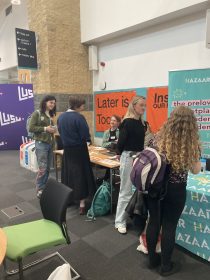
SOS-UK Student Sustainability Summit Round-Up:
On Wednesday the 29th of May, Megan, our Graduate Sustainability Communications & Engagement Officer and Elena, our Sustainability Communications and Campaigns Intern from the Sustainability Office attended the annual SOS-UK Student Sustainability Summit. They attended alongside two students Oliver and

SOS-UK Student Sustainability Summit Round-Up:
On Wednesday the 29th of May, Megan, our Graduate Sustainability Communications & Engagement Officer and Elena, our Sustainability Communications and Campaigns Intern from the Sustainability Office attended the annual SOS-UK Student Sustainability Summit. They attended alongside two students Oliver and
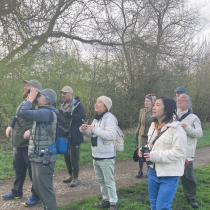
BioBlitz-Go Green Salford 2024 :
A two-day BioBlitz was held in and around the University of Salford’s Peel Park campus in March as part of our Go Green Salford activities. To to find out more about our Go Green Salford campaign, check out our blog

BioBlitz-Go Green Salford 2024 :
A two-day BioBlitz was held in and around the University of Salford’s Peel Park campus in March as part of our Go Green Salford activities. To to find out more about our Go Green Salford campaign, check out our blog
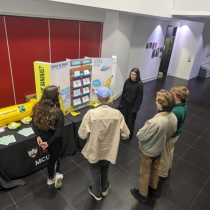
Round-Up of Go Green Salford 2024
From 4th-22nd of March 2024, The Sustainability Team at the University of Salford ran its annual Go Green Salford 2024 campaign, to encourage students and staff across its three campuses to take part in its various activities, pop-up displays and

Round-Up of Go Green Salford 2024
From 4th-22nd of March 2024, The Sustainability Team at the University of Salford ran its annual Go Green Salford 2024 campaign, to encourage students and staff across its three campuses to take part in its various activities, pop-up displays and

Electric cars – by Tessa Pettitt
With the move to more sustainable travel, me and my family recently decided to change our car to a fully electric one. In order to help people who might be considering this next step, I figured I would write an

Electric cars – by Tessa Pettitt
With the move to more sustainable travel, me and my family recently decided to change our car to a fully electric one. In order to help people who might be considering this next step, I figured I would write an
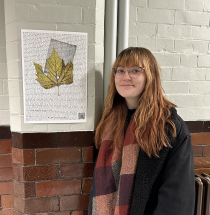
PlasticFreeUoS poster series by Jess Robinson
To support the PlasticFreeUoS campaign, a MA Visual Communication student Jessica Robinson from the University of Salford School of Arts, Media and Creative Technology has made a series of brilliant posters to raise awareness of the issues related to single

PlasticFreeUoS poster series by Jess Robinson
To support the PlasticFreeUoS campaign, a MA Visual Communication student Jessica Robinson from the University of Salford School of Arts, Media and Creative Technology has made a series of brilliant posters to raise awareness of the issues related to single
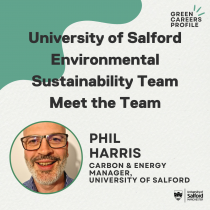
Meet the Team: Phil Harris
Current role Phil is focused on reducing the University’s Scope 1 & 2 carbon emissions, maintaining the ISO 50001 certification for energy management, and working with the Estates department and the Sustainability Office to deliver the Net Zero carbon ambitions.

Meet the Team: Phil Harris
Current role Phil is focused on reducing the University’s Scope 1 & 2 carbon emissions, maintaining the ISO 50001 certification for energy management, and working with the Estates department and the Sustainability Office to deliver the Net Zero carbon ambitions.
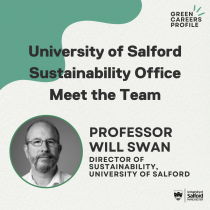
Meet the Team: Prof Will Swan, Director of Sustainability
Will is in charge of the strategic direction of the Sustainability Office. This involves the development of the strategy, the development of strategic relations and oversight of operational activities. Will is currently leading the engagement work around the strategy, as

Meet the Team: Prof Will Swan, Director of Sustainability
Will is in charge of the strategic direction of the Sustainability Office. This involves the development of the strategy, the development of strategic relations and oversight of operational activities. Will is currently leading the engagement work around the strategy, as

Virtual Peel Park
Last week we launched Virtual Peel Park – a digital tool which makes the park more accessible to all. The project is led by Dr Simon Hutchinson from SEE, in collaboration with our team and the Salford Ranger Team. The

Virtual Peel Park
Last week we launched Virtual Peel Park – a digital tool which makes the park more accessible to all. The project is led by Dr Simon Hutchinson from SEE, in collaboration with our team and the Salford Ranger Team. The
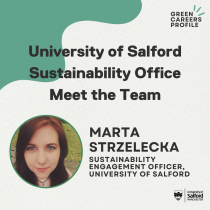
Meet the Team: Marta Strzelecka, Sustainability Engagement Officer
Current role Leading on sustainability communications and engagement in the Sustainability Office to help and enable our students and staff to make sustainable choices. Coordinating a programme of events and initiatives, including Hedgehog Friendly Campus, Plastic Free UoS, Community Growing

Meet the Team: Marta Strzelecka, Sustainability Engagement Officer
Current role Leading on sustainability communications and engagement in the Sustainability Office to help and enable our students and staff to make sustainable choices. Coordinating a programme of events and initiatives, including Hedgehog Friendly Campus, Plastic Free UoS, Community Growing
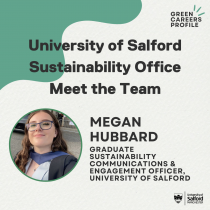
Meet the Team: Megan Hubbard, Graduate Sustainability Communication & Engagement Officer
Current role Works with both the Sustainability Office and the Students Union. The role involves supporting the Sustainability Communications and Engagement Strategy, whilst also assisting in student-focussed sustainability projects and volunteering. Ultimately, helping to raise awareness and engage staff and

Meet the Team: Megan Hubbard, Graduate Sustainability Communication & Engagement Officer
Current role Works with both the Sustainability Office and the Students Union. The role involves supporting the Sustainability Communications and Engagement Strategy, whilst also assisting in student-focussed sustainability projects and volunteering. Ultimately, helping to raise awareness and engage staff and
